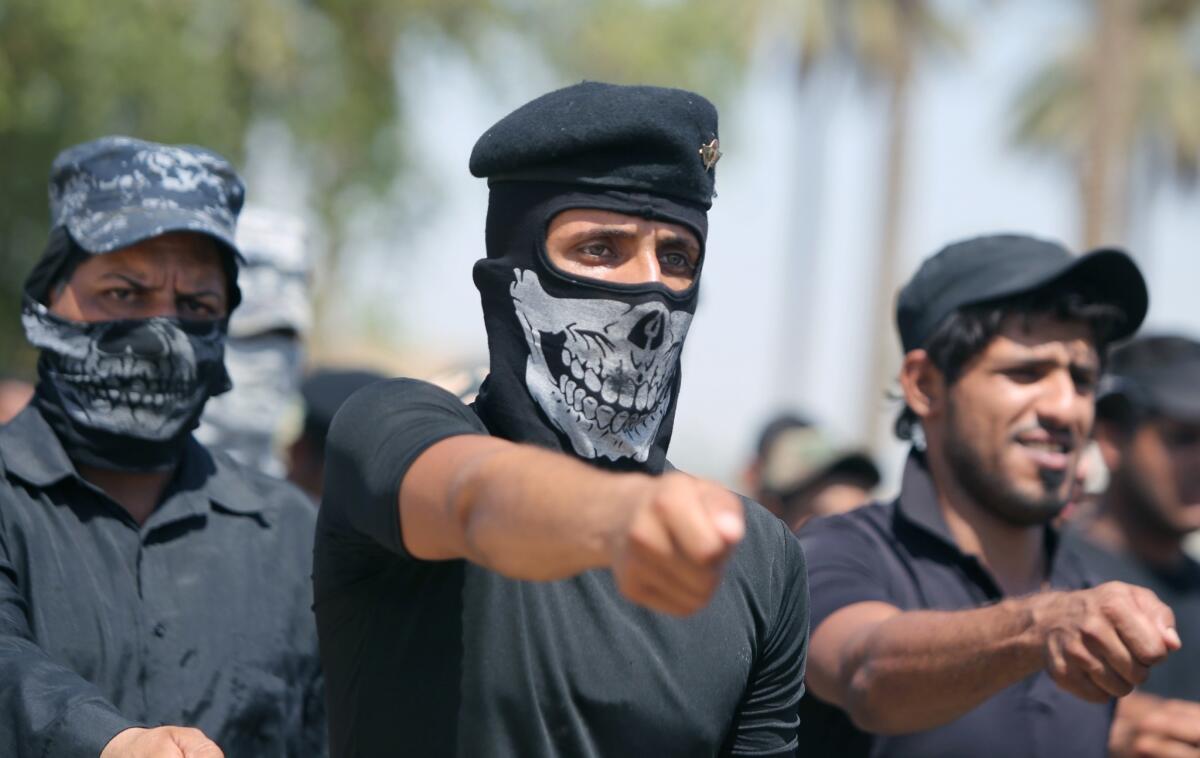Over 50 bodies found in Iraq, raising fears of new massacres

- Share via
Reporting from Baghdad — The bodies of more than 50 people apparently killed in a sectarian slaying were found south of Baghdad, Iraqi authorities said Wednesday, adding to fears of a new round of massacres driven by Sunni-Shiite conflicts.
The corpses were discovered late Tuesday in agricultural fields outside Hillah, authorities said. Murad Bakri, a spokesman for the governor of Babel province, confirmed the news by telephone, adding the victims’ “hands were tied, and they had been blindfolded.”
Local media outlets described the corpses as having been shot at close range in the back of the head, quoting an unnamed security source who said the bodies belonged to “Al Qaeda gunmen” and had been dead for some time.
Although official sources did not identify the sect of the deceased, the report nevertheless is a harbinger of Iraq’s possible descent into the vicious pattern of sectarian killings that ravaged the nation during 2006 and 2007, when rival Shiite Muslim and Sunni Muslim death squads killed tens of thousands. Al Qaeda is a Sunni organization.
The violence slowed in 2008. But an uprising this year among the Sunni minority, which has seen large swathes of northern and western Iraq fall into the hands of an Al Qaeda renegade faction, threatens to open a new chapter of communal carnage.
Meanwhile, embattled Prime Minister Nouri Maliki warned of the existence of “an operations room” in the northern city of Irbil, in the semi-autonomous Kurdish region, staffed by “criminals from the remnants of Baathists, Al Qaeda, and Takfiris.”
The Shiite-led government in Baghdad has accused former loyalists of Saddam Hussein’s Baathist administration of cooperating with Al Qaeda elements in the current rebellion. Takfiris is a term used for Sunni militants who view Shiites, the majority sect in Iraq, as infidels.
The two-term prime minister also assailed the Kurdistan regional government, all but accusing its leaders of collusion with Sunni Arab militants.
The insurgents “will lose, as will their host, because they did not provide a good example of national partnership,” Maliki said in his nationally televised weekly address. “If you want a true partnership, then give us proof of a national position that refuses to cooperate with those people.”
There was no immediate response from representatives of the Kurdish administration in northern Iraq.
Maliki has steadfastly maintained that the army’s collapse last month before an onslaught of Sunni insurgents was a conspiracy of “nefarious goals” that saw Baathists and other Sunni militants join forces with the Islamic State, an Al Qaeda breakaway group previously known as the Islamic State of Iraq and Syria, or ISIS.
“But ISIS rode on all their backs,” Maliki said, referring to widespread reports of the extremist group kidnapping opponents and potential rivals in areas under its control, including the northern city of Mosul.
Despite initial setbacks, Maliki said the army had gained the upper hand and had transformed the battle into one of “advancing toward liberation” as opposed to “repulsing a barbaric attack by Al Qaeda.”
Opponents accuse the two-term prime minister of worsening sectarian divisions and have called on him not to seek a third term. Maliki says he is the democratically elected leader and has no intention of stepping down in the middle of a war that threatens the Iraqi state.
Bulos is a special correspondent. Times staff writer Patrick J. McDonnell contributed to this report.
Follow @mcdneville on Twitter for news from the Middle East
More to Read
Sign up for Essential California
The most important California stories and recommendations in your inbox every morning.
You may occasionally receive promotional content from the Los Angeles Times.











